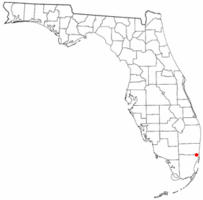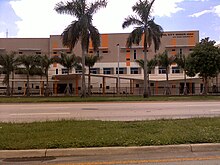Neighborhood of Miami Gardens in Miami-Dade, Florida, United States
| Carol City | |
|---|---|
| Neighborhood of Miami Gardens | |
 Location in the state of Florida Location in the state of Florida | |
| Coordinates: 25°56′32″N 80°16′12″W / 25.94222°N 80.27000°W / 25.94222; -80.27000 | |
| Country | |
| State | |
| County | |
| City | Miami Gardens, Florida |
| Area | |
| • Total | 7.7 sq mi (20.0 km) |
| • Land | 7.6 sq mi (19.7 km) |
| • Water | 0.1 sq mi (0.3 km) |
| Population | |
| • Total | 59,443 |
| • Density | 7,700/sq mi (3,000/km) |
| Time zone | UTC-5 (Eastern (EST)) |
| • Summer (DST) | UTC-4 (EDT) |
| ZIP codes | 33055-33056 |
| Area code | 305 |
| FIPS code | 12-10650 |
Carol City is a neighborhood in Miami Gardens, Florida, United States. It was formerly listed as a census-designated place in the 2000 U.S. Census.
History
Julius Gaines, the developer, had originally planned to name it Coral City. However, under threat of a lawsuit by Coral Gables, he changed the name, switching the O and A.
In the 1960s, much of Carol City included farmland. As the decades progressed, many people in Miami Gardens blamed the public housing in the area, including the developments around Carol City High School, of importing crime and recreational drugs into the area. In 2007, Mayor Shirley Gibson of Miami Gardens announced she would not allow any more public housing projects to open in Miami Gardens.
On July 27, 1977, six people were killed and a further two were injured during a mass shooting at a house in Carol City. At the time, the shooting was the largest case of mass murder in Miami-Dade County history.
Geography
Carol City is located at 25°56′32″N 80°16′12″W / 25.94222°N 80.27000°W / 25.94222; -80.27000 (25.942121, -80.269920). According to the United States Census Bureau, the community has a total area of 20.0 km (7.7 sq mi). 19.7 km (7.6 sq mi) of it is land and 0.3 km (0.12 sq mi) of it (1.42%) is water.
Notable people
- Carl Hart - Psychologist and neuroscientist
- Rick Ross - Rapper
- Flo Rida - Rapper
- Gunplay - Rapper
- Spaceghostpurrp - Rapper
- Bigg D - Record producer
- Denzel Curry - Rapper
- Santana Moss - Former NFL Player
- Jo Marie Payton - American Actress
Demographics
| Census | Pop. | Note | %± |
|---|---|---|---|
| 1960 | 21,749 | — | |
| 1970 | 27,361 | 25.8% | |
| 1980 | 47,349 | 73.1% | |
| 1990 | 53,331 | 12.6% | |
| 2000 | 59,443 | 11.5% | |
| U.S. Decennial Census 1990 2000 | |||
2000 census
| Race / Ethnicity (NH = Non-Hispanic) | Pop 2000 | % 2000 |
|---|---|---|
| White alone (NH) | 3,798 | 6.39% |
| Black or African American alone (NH) | 29,560 | 49.73% |
| Native American or Alaska Native alone (NH) | 65 | 0.11% |
| Asian alone (NH) | 317 | 0.53% |
| Pacific Islander alone (NH) | 22 | 0.04% |
| Other race alone (NH) | 101 | 0.17% |
| Mixed race or Multiracial (NH) | 615 | 1.03% |
| Hispanic or Latino (any race) | 24,965 | 42.00% |
| Total | 59,443 | 100.00% |
As of the census of 2000, there were 59,443 people, 16,402 households, and 14,089 families residing in the community. The population density was 3,012.0 people/km (7,801 people/sq mi). There were 17,049 housing units at an average density of 863.9 units/km (2,237 units/sq mi). The racial makeup of the CDP was 52.10% African American, 38.11% White (6.4% were Non-Hispanic White,). 0.55% Asian, 0.19% Native American, 0.04% Pacific Islander, 5.53% from other races, and 3.48% from two or more races. Hispanic or Latino of any race were 42.00% of the population.
There were 16,402 households, out of which 42.7% had children under the age of 18 living with them, 52.4% were married couples living together, 26.5% had a female householder with no husband present, and 14.1% were non-families. 10.8% of all households were made up of individuals, and 2.6% had someone living alone who was 65 years of age or older. The average household size was 3.58 and the average family size was 3.75.
In the area the population was spread out, with 31.0% under the age of 18, 9.7% from 18 to 24, 28.6% from 25 to 44, 22.4% from 45 to 64, and 8.2% who were 65 years of age or older. The median age was 32 years. For every 100 females, there were 92.5 males. For every 100 females age 18 and over, there were 87.1 males.
The median income for a household in the community was $38,652, and the median income for a family was $39,596. Males had a median income of $26,079 versus $22,169 for females. The per capita income for the community was $12,600. About 14.3% of families and 16.5% of the population were below the poverty line, including 21.5% of those under age 18 and 18.2% of those age 65 or over.
As of 2000, before being annexed to Miami Gardens, English as a first language accounted for 53.73% of all residents, Spanish accounted for 43.16%, and French Creole made up 2.15% of the population.
As of 2000, the Carol City section of Miami Gardens had the twenty-seventh highest percentage of Cuban residents in the US, with 18.75% of the populace. It had the nineteenth highest percentage of Jamaican residents in the U.S. at 5.80% (which tied with Lake Park, Florida,) and the thirty-ninth highest percentage of Dominican residents in the U.S. at 3% of its population. It had the fifty-sixth most Haitians in the U.S. at 2.50% (tied with five other areas in the U.S., including Plantation and Taft, Florida) while it had the twentieth highest percentage of Nicaraguans at 2.20% of all residents. The Carol City neighborhood of Miami Gardens is home to the seventieth highest percentage of Colombian residents in the U.S. at 2.15% of the population.
Education

Carol City is within the Miami-Dade Public Schools district.
Elementary schools within the former CDP that are now in Miami Gardens include Brentwood, Carol City, Barbara Hawkins, Miami Gardens, Myrtle Grove, and Skyway. Elementary schools within the former CDP that are in unincorporated areas include Lake Stevens, North Glade, and Charles David Wyche Jr.
Carol City Middle School is located in Miami Gardens and in the former CDP. Lake Stevens Middle School is located in an unincorporated area and in the former CDP. Miami Carol City High School is located within Miami Gardens and in the former Carol City CDP. It opened in fall 1963.
The North Campus of Sandor Weiner School of Opportunity, a charter school, is located in the former CDP and in an unincorporated area.
The Roman Catholic Archdiocese of Miami formerly operated the Saint Monica School in the Carol City CDP.
See also
References
- ^ "U.S. Census website". United States Census Bureau. Retrieved 2008-01-31.
- Morris, Allan (1995). Florida Place Names: Alachua to Zolfo Springs. Sarasota, Florida: Pineapple Press, Inc. p. 44. ISBN 1-56164-084-0.
- ^ Garcia-Roberts, Gus. "The Curse." Miami New Times. February 10, 2009. 1. Retrieved on February 11, 2009.
- Garcia-Roberts, Gus. "The Curse." Miami New Times. February 10, 2009. 2 Archived 2009-02-20 at the Wayback Machine. Retrieved on February 11, 2009.
- Ovalle, David (October 15, 2012). "Pending execution casts spotlight on horrific Miami murder spree in late '70s". The Bradenton Herald. Archived from the original on April 2, 2017. Retrieved May 9, 2022.
- "US Gazetteer files: 2010, 2000, and 1990". United States Census Bureau. 2011-02-12. Retrieved 2011-04-23.
- "Decennial Census of Population and Housing by Decades". US Census Bureau.
- "1990 Census of Population - Summary Social, Economic, and Housing Characteristics - Florida" (PDF). US Census Bureau. 1990.
- "2000 Census of Population - General Population Characteristics - Florida" (PDF). United States Census Bureau. 2000.
- "P004 Hispanic or Latino, and Not Hispanic or Latino by Race – 2000: DEC Summary File 1 – Carol City CDP, Florida". United States Census Bureau.
- "Demographics of Carol City, Florida". MuniNetGuide.com. Archived from the original on 2008-04-15. Retrieved 2007-11-04.
- "MLA Data Center Results of Carol City, Florida". Modern Language Association. Retrieved 2007-11-04.
- "Ancestry Map of Cuban Communities". Epodunk.com. Archived from the original on 2012-11-22. Retrieved 2007-11-04.
- "Ancestry Map of Jamaican Communities". Epodunk.com. Archived from the original on 2007-10-11. Retrieved 2007-11-04.
- "Ancestry Map of Dominican Communities". Epodunk.com. Archived from the original on 2010-10-17. Retrieved 2007-11-04.
- "Ancestry Map of Haitian Communities". Epodunk.com. Archived from the original on 2012-09-23. Retrieved 2007-11-04.
- "Ancestry Map of Nicaraguan Communities". Epodunk.com. Archived from the original on 2010-10-17. Retrieved 2007-11-04.
- "Ancestry Map of Colombian Communities". Epodunk.com. Archived from the original on 2007-10-11. Retrieved 2007-11-04.
- ^ "Carol City CDP, Florida." U.S. Census Bureau. Retrieved on September 27, 2009.
- "Contact Us Archived 2010-06-20 at the Wayback Machine." Sandor Weiner School of Opportunity. Retrieved on September 27, 2009.
- "Elementary Schools". Roman Catholic Archdiocese of Miami. 2000-10-18. Archived from the original on 2000-10-18. Retrieved 2020-05-10.
- "2000 Census Block Map: Carol City CDP" (PDF). U.S. Census Bureau. Retrieved 2020-05-10. - Location with St. Monica is on page 2
Further reading
- "2000 Census Block Map: Carol City CDP" (PDF). U.S. Census Bureau. - Pages: 1, 2, 3, and 4
- The 1990 U.S. Census Bureau map of Dade County, Florida has this CDP on Page 3
External links
| Miami Gardens, Florida | |
|---|---|
| Geography | |
| Areas | |
| Governance | |
| City agencies | |
| Education | |
| Primary and secondary schools | |
| Other education | |
| Other | |
| Landmarks | |
| History | |
| Municipalities and communities of Miami-Dade County, Florida, United States | ||
|---|---|---|
| County seat: Miami | ||
| Cities |  | |
| Towns | ||
| Villages | ||
| CDPs |
| |
| Unincorporated communities | ||
| Ghost town | ||
| Indian reservation | ||
| Footnotes | ‡This populated place also has portions in an adjacent county or counties | |
| Miami metropolitan area | |
|---|---|
| Population - 6,012,331 | |
| Counties | |
| Major city 441 thousand | |
| Cities and towns 100k-250k | |
| Cities and towns 25k-99k |
|
| Cities and towns 10k-25k | |
| A list of cities under 10,000 is available here. | |